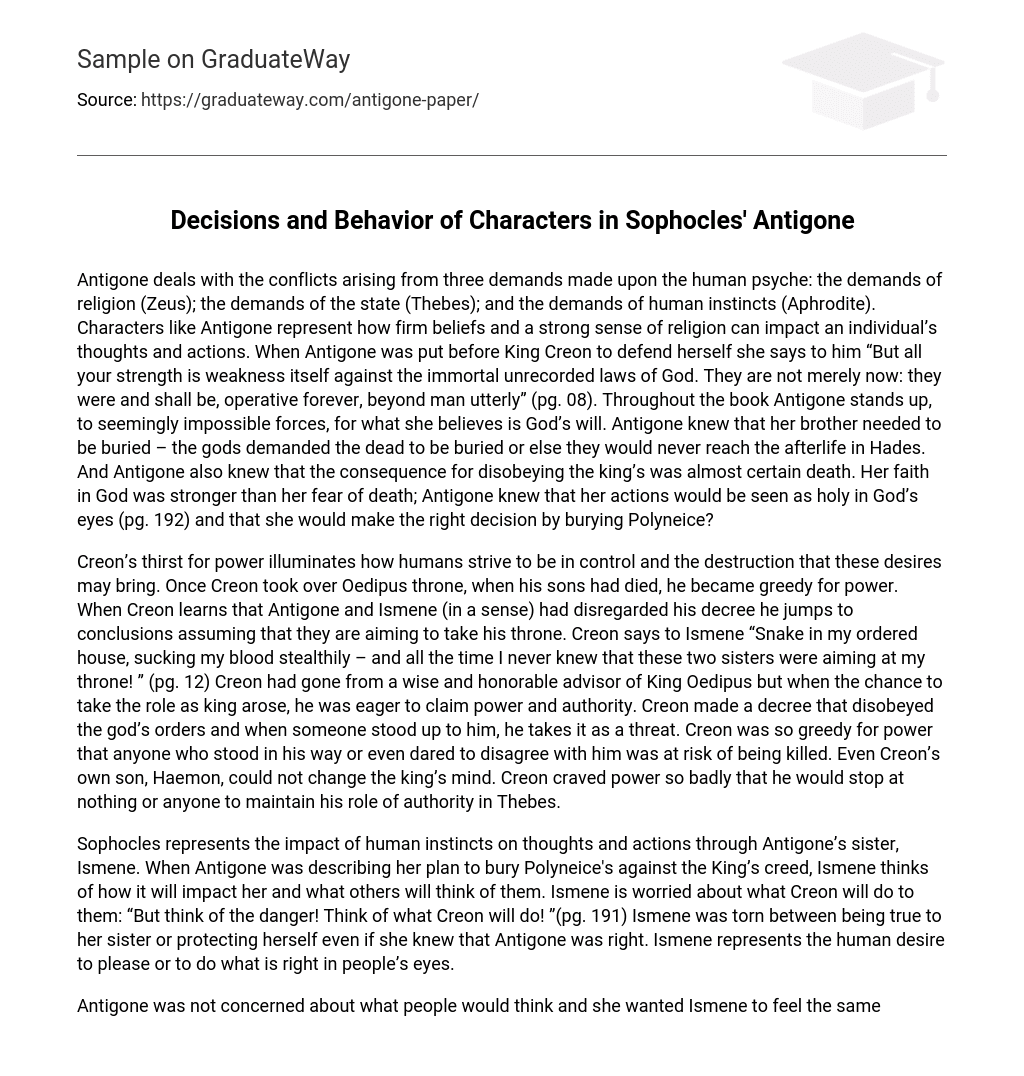Antigone explores the conflicts arising from three demands that the human psyche must confront: the demands of religion (Zeus), the demands of the state (Thebes), and the demands of human instincts (Aphrodite). The character of Antigone exemplifies how strong beliefs and a deep sense of religious devotion can profoundly influence an individual’s thoughts and actions. When Antigone is confronted by King Creon and asked to defend herself, she boldly asserts, “But all your strength is weakness itself against the immortal unrecorded laws of God. They are not merely now: they were and shall be, operative forever, beyond man utterly” (pg. 08). Throughout the narrative, Antigone fearlessly challenges seemingly insurmountable forces in order to uphold what she believes to be God’s will. Recognizing that her brother must receive a proper burial according to the gods’ decrees for them to reach the afterlife in Hades, Antigone is aware of the almost certain death that awaits her for disobeying the king’s orders. Nevertheless, her faith in God surpasses her fear of death. Antigone firmly believes that her actions align with divine righteousness (pg. 192), and she remains steadfast in her conviction to bury Polyneices.
Creon’s hunger for power showcases humanity’s yearning for control and the potential devastation that accompanies such desires. After assuming the throne following the deaths of Oedipus’ sons, Creon became consumed by greed for power. Upon discovering Antigone and Ismene’s apparent disregard for his decree, Creon hastily jumped to conclusions, suspecting a plot to usurp his throne. He even accused Ismene, saying “You sneaking snake in my well-ordered home, stealing my life-blood away — all the time I never knew that these sisters were plotting against me!” (pg. 12) Initially an wise and honorable advisor to King Oedipus, Creon eagerly seized power and authority when given the chance to become king. He issued a decree defying the gods’ commands and viewed anyone who challenged him as a threat. His insatiable thirst for power made him ruthless, to the point where not even his own son Haemon could convince him otherwise. Creon’s intense lust for power was so overwhelming he would stop at nothing — or spare anyone — in order to maintain authority in Thebes.
The impact of human instincts on thoughts and actions is portrayed by Sophocles through Antigone’s sister, Ismene. When Antigone reveals her plan to bury Polyneices against the King’s decree, Ismene contemplates the potential consequences and what others will think of them. Ismene expresses concern about Creon’s potential actions towards them, stating, “But think of the danger! Think of what Creon will do!” (pg. 191). Ismene finds herself torn between remaining loyal to her sister or prioritizing her own safety, even though she acknowledges that Antigone is in the right. In this way, Ismene represents the innate human desire to please others and uphold societal expectations.
Antigone was unconcerned about public opinion and sought for Ismene to share the same mindset. However, Ismene was fearful. At first, Ismene chose to ignore her sister’s actions and pretend ignorance of her plans. Yet, when Antigone was brought to trial, Ismene had a change of heart and desired to stand alongside Antigone in her punishment. Nonetheless, it was too late as Ismene had already rejected assisting Antigone. Antigone refused to accept her belated support. Ismene had allowed her fear of consequences to prevent her from doing what is morally right.
Sophocles employs his characters to bring these demands closer to his readers’ awareness. Antigone exemplifies the ideal faith to be pursued; a faith that eradicates all fear of consequences, others’ judgments, or even death. Creon portrays how greed and selfish desires can hinder the capacity to make sound choices. Meanwhile, Ismene demonstrates how succumbing to others’ opinions and fears of consequences can influence our decision-making. In its entirety, Antigone depicts the tragic downfall of an individual, while also highlighting the power of faith, the influence of human instincts on our choices, and their impact on the human psyche.





